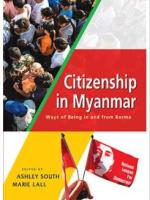Citizenship in Myanmar is a contested issue
Myanmar is going through a period of profound and contested transition. In the 2015 election, after five decades of military rule, the democracy icon Aung San Suu Kyi and her party the National League for Democracy (NLD) won a landslide victory. However, democratization is only gradual, as the military still has considerable political power in parliament and control key ministries. In 2017, Myanmar filled the international headlines again as the conflict in Rakhine State in northwestern Myanmar escalated and over 600.000 people fled to Bangladesh. The vast majority of these refugees self-identify as Rohingya people, and are Muslims. They are denied citizenship in Myanmar and are today stateless people. Alongside this human tragedy in Rakhine State, Myanmar is experiencing a range of uneven reforms, including the start of a peace process between the government, the Myanmar army, and some two dozen ethnic armed organizations, which have been fighting for greater autonomy from the militarized and Burman-dominated state.
This new and timely book on Citizenship in Myanmar. Ways of being in and from Burma (edited by Ashley South and Marie Lall) brings together chapters by Burmese and foreign experts and contributions from community and political leaders who discuss the meaning of citizenship in Myanmar/Burma. The book explores citizenship in relation to three broad categories: issues of identity and conflict; debates around concepts and practices of citizenship; and inter- and intra-community issues including Buddhist–Muslim relations. This is the first volume to address these issues of citizenship, which will be central to Myanmar's continued transition away from violence and authoritarianism.
In the book DIIS senior researcher, Helene Maria Kyed has a chapter with Mikael Gravers (Aarhus University) on citizenship and representation in relation to the future roles and positions of the ethnic armed organizations (EAOs) in Myanmar. Their empirical focus is on Mon and Karen states, where two major EAOs, the Karen National Union (KNU) and the New Mon State Party (NMSP) have struggled for almost sixty years with the military government to defend ethnic minority rights and establish some level of self-determination. Today these armed organizations have ceasefires with the government, but they remain armed. In addition, in the areas they control, they run their own state-like institutions, including administration, taxation, justice provision, policing, health and education.
Kyed and Gravers argue that in order to achieve sustainable peace in Myanmar it is necessary to discuss the future role of the many ethnic armed actors in different spheres of civilian and political life, like business development, civil society organizations, political parties and public administration. However, it is crucial that reintegration of ethnic armed actors is linked to a general improvement of citizenship rights for the ethnic groups more broadly. While the Karen and Mon ethnic groups have official access to citizenship, unlike for instance the Rohingya, they often do not de facto get access to the same benefits as the majority Bamar group and they have lower political representation. Conversely, the state-like systems and services of the ethnic armed groups, the KNU and the NMSP, have often substituted for an absent and exclusionary Myanmar state. Recognizing these systems as part of both a shorter and longer-term solution to the contested situation in Myanmar could considerably contribute to more inclusive citizenship in the future.
DIIS Experts



